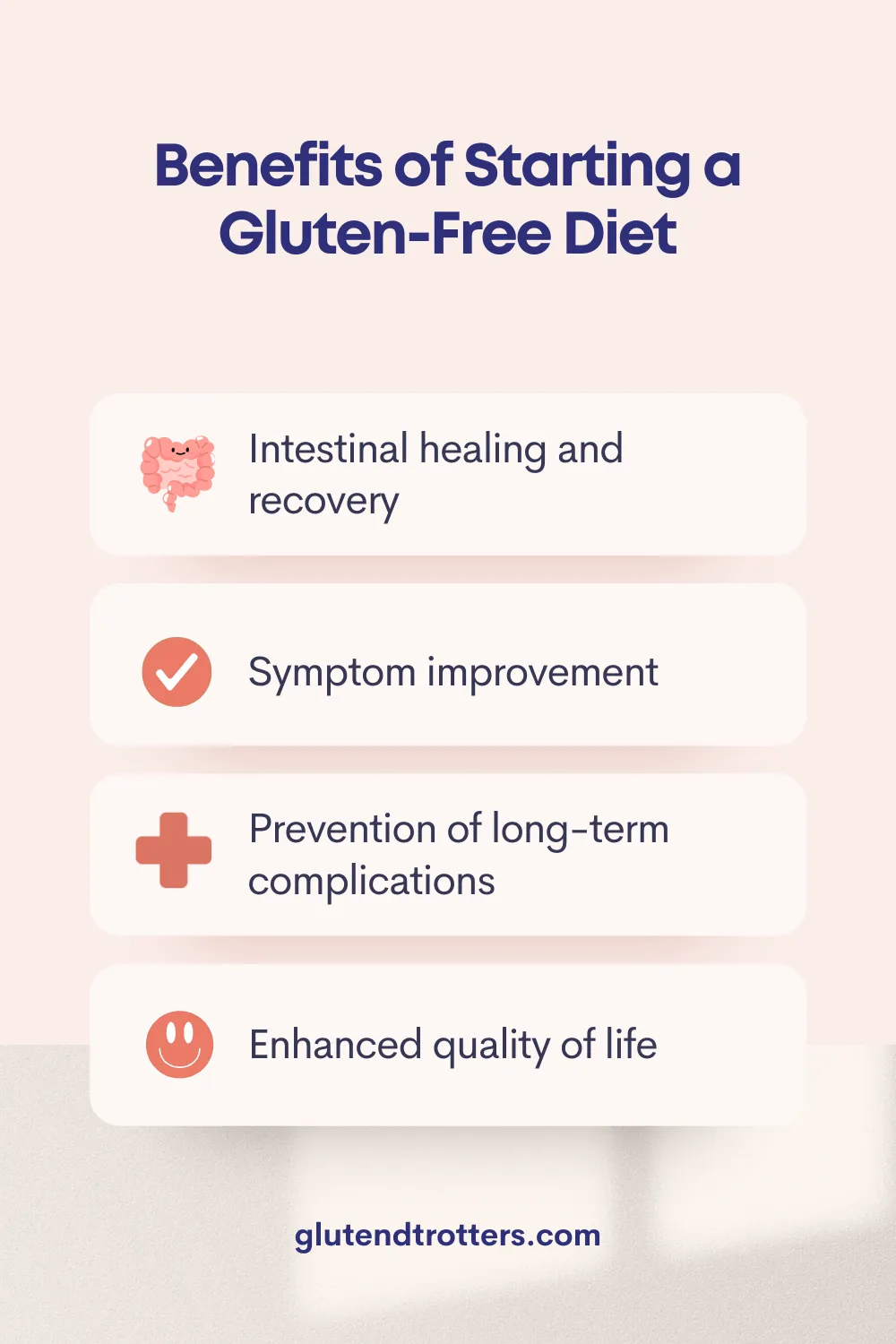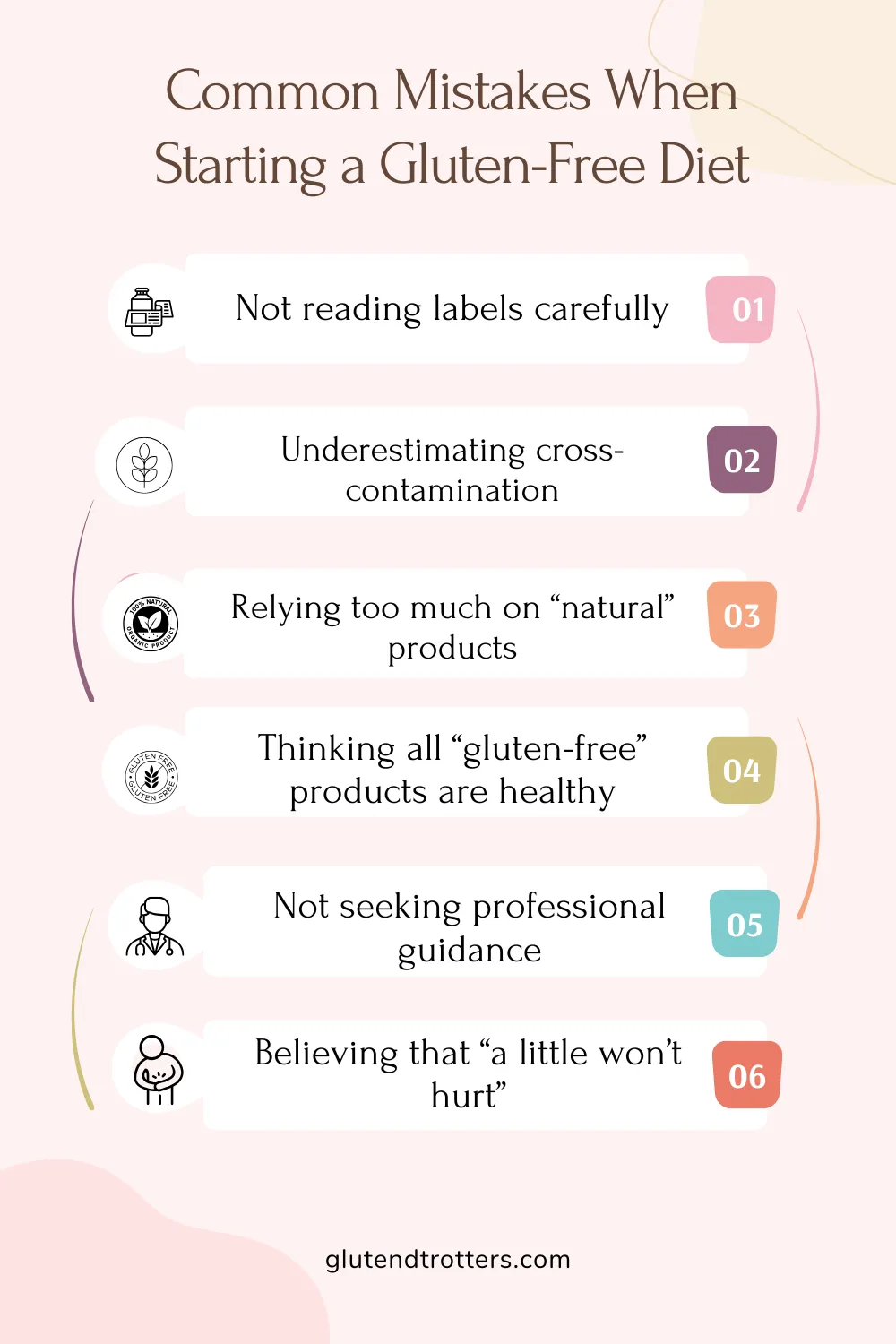Starting gluten-free diet has gained significant attention in recent years, not only among those who must follow it for medical reasons but also among healthy individuals seeking to improve their well-being. However, for those with celiac disease or gluten sensitivity, maintaining this eating plan strictly is a matter of health — not a passing trend.
In this guide, we’ll explain what a gluten-free diet is, the key health benefits of going gluten-free for people with celiac disease, and the most common mistakes to avoid when starting a gluten-free lifestyle.
What Is a Gluten-Free Diet?
The gluten-free diet is an eating plan that eliminates all foods containing gluten, a protein naturally found in grains such as wheat, barley, and rye. Although oats are naturally gluten-free, they are often contaminated during processing, so they should only be consumed if certified as “gluten-free.”
For people with celiac disease, gluten acts as a “silent enemy.” When consumed, the immune system reacts abnormally, attacking the lining of the small intestine. This leads to inflammation, damage to the intestinal villi (tiny structures responsible for absorbing nutrients), and, as a result, a wide range of health problems.
In addition to those with celiac disease, other people may also benefit from a gluten-free diet under medical supervision, such as individuals with non-celiac gluten sensitivity or, to a lesser extent, those with certain autoimmune conditions or digestive disorders.igestivos.
Allowed Foods on a Gluten-Free Diet
A well-planned gluten-free diet doesn’t have to be restrictive. Foods that are naturally free of this protein include:
- Fresh fruits and vegetables
- Unprocessed meat, fish, and seafood
- Eggs.
- Unprocessed dairy products
- Legumes, nuts, and seeds
- Rice, corn, quinoa, millet, sorghum, buckwheat, and amaranth
Nowadays, there is also a wide variety of products specifically for people with celiac disease, such as bread, cookies, pasta, and flours labeled as gluten-free, which make the transition easier.
Also read: List of Gluten-Free Foods: Safe Options and Foods to Avoid
Foods to avoid
It is essential to completely eliminate:
- Bread, cakes, pastries, and pizzas made with wheat, barley, or rye.
- Regular pasta.
- Traditional beer (unless certified gluten-free)
- Processed products that may contain hidden gluten, such as thickeners, sauces, or breaded foods
Benefits of a Gluten-Free Diet
Starting a gluten-free diet is, so far, the only effective treatment for celiac disease. There is no medication that can cure this condition, so completely eliminating gluten is essential to manage symptoms, heal intestinal damage, and prevent long-term complications.
The results of strictly following a gluten-free diet can be profound and life-changing for the health and quality of life of people with celiac disease.
1. Intestinal healing
One of the main benefits of eliminating gluten is the gradual regeneration of damaged intestinal villi. These tiny structures, located in the lining of the small intestine, are essential for nutrient absorption.
When someone with celiac disease continues to consume gluten, the villi become atrophied, leading to malnutrition even if they follow an otherwise healthy diet.
By completely eliminating gluten, a recovery process begins that can take anywhere from six months to two years, depending on factors such as the patient’s age, the extent of intestinal damage, and strict adherence to the dietary treatment.
In young children, regeneration is usually faster, while in adults it may be slower and require longer medical monitoring.
2. Improvement of symptoms
Eliminating gluten usually leads, in most cases, to the disappearance of the most troublesome digestive symptoms:
- Chronic diarrhea.
- Abdominal pain and cramps.
- Bloating and gas.
- Nausea and vomiting.
- Unintentional weight loss.
But the benefits are not limited to the digestive system. Many “silent” or less obvious symptoms also improve significantly:
- Chronic fatigue: extreme and unexplained tiredness often subsides within a few weeks.
- Joint pain: systemic inflammation decreases, reducing muscle and joint discomfort.
- Problemas dermatológicos: Skin problems: in cases of dermatitis herpetiformis, lesions improve or disappear completely.
- Iron-deficiency anemia: absorption improves, helping restore normal levels of iron, vitamin B12, and folic acid.
Improvements are also seen in concentration, mood, and overall energy levels.
3. Avoiding complications
Strictly following this eating plan not only helps relieve symptoms but also prevents serious complications:
- Osteoporosis: proper absorption of calcium and vitamin D helps strengthen bones.
- Infertility: a gluten-free diet can improve the chances of conception.
- Liver diseases: liver enzyme levels return to normal.
- Risk of intestinal lymphoma and other types of cancer: reduced by avoiding continuous exposure to gluten.
4. Enhancing quality of life
Beyond the clinical benefits, starting a gluten-free diet can significantly enhance quality of life. As symptoms disappear, vitality increases, mood improves, and confidence is restored.
Thanks to greater social awareness and the availability of safe products and spaces, maintaining this type of diet is now much more accessible.


Glutendtrotters Experience
In Manuela’s case, the recovery was remarkable. Before her diagnosis, she could barely walk due to the effects of the disease. However, after starting the diet, she was able to walk again in just two weeks. Within a year, her recovery was complete. She now undergoes annual medical check-ups and, fortunately, all results remain positive.
Common Mistakes When Starting a Gluten-Free Diet
Adopting a gluten-free diet isn’t just about avoiding traditional bread or pasta. There are many factors that can make the difference between a successful approach and one that puts a celiac’s health at risk.
1. Not reading labels carefully
One of the most common mistakes is not carefully checking product ingredients. Gluten can appear under less obvious names such as “vegetable protein,” “modified starch,” “malt,” or “dextrin.” It can also be present in processed meats, candies, pâtés, medications, supplements, and even cosmetics.
It’s crucial to choose certified products and, when in doubt, contact the manufacturer directly.
2. Underestimating cross-contamination
Indirect contact between safe foods and those containing gluten can cause significant reactions. This cross-contact often occurs in:
- Shared kitchens without proper protocols.
- Contaminated utensils.
- Deep fryers used for mixed frying.
- Toasters or cutting boards without separation.
To prevent this, it’s recommended to have designated areas and utensils exclusively for those who need to follow this diet.

Glutendtrotters Tip
At home, we all eat gluten-free except for Aitana and Paola, who have gluten-containing products only at breakfast. To prevent incidents, we keep those foods in a sealed box and on the lowest shelf of the pantry.
3. Relying too much on “natural” products
Although many fresh foods such as meat, fruits, or vegetables are naturally gluten-free, they can become contaminated during processing or packaging. That’s why it’s best to choose brands that certify safe practices or, whenever possible, products specifically labeled as gluten-free.te.
4. Believing that everything “gluten-free” is healthy
There is a wide variety of products on the market designed for people with celiac disease, but many of them are high in fats, sugars, or additives. A balanced diet should prioritize fresh, whole, and minimally processed foods.
5. Not seeking professional guidance
Starting this type of diet without the guidance of a doctor or dietitian can lead to nutritional deficiencies. The most commonly affected nutrients include fiber, iron, calcium, vitamin D, B12, and folic acid.
In addition, removing gluten without prior medical testing can make diagnosing celiac disease more difficult.
6. Thinking that “a little won’t hurt”
A dangerous belief in the first months after diagnosis is thinking that small amounts of gluten won’t have an impact. However, even a crumb can cause intestinal damage, even if no visible symptoms appear.
The commitment must be absolute. There are no safe exceptions. Learning to say “no,” setting boundaries, and educating those around you is key to long-term safety.

Tips for Getting Started on The right Foot
If you’re starting this journey, here are some key tips:
- Seek professional support: A gastroenterologist and a nutritionist can guide you from the very beginning.
- Organize your kitchen: Keep utensils, foods, and surfaces separate to avoid cross-contamination. Also read: Gluten-Free Kitchen: 10 Smart Tips to Stay Organized
- Learn to read labels: Get familiar with high-risk ingredients.
- Plan your meals: Make daily life easier and avoid unexpected situations.
- Get informed and surround yourself with a community: Associations, forums, and support groups can be very helpful.
- Be patient: Adapting takes time. Stay consistent and don’t get discouraged.
Final thoughts on starting a gluten-free diet
A gluten-free diet is much more than cutting out a few foods — it’s a commitment to the health and well-being of those who need it. Understanding its core principles, the benefits it offers, and the mistakes to avoid is essential to ensure real recovery and a better quality of life.
Are you starting this journey or looking to improve your habits?
Related Posts:
- 7 Gluten-Free Travel Tips and Guide for Celiacs
- Living with Celiac Disease: Symptoms, Treatment and Personal Experience
- Best Diet for Hypothyroidism: Complete Guide, Real Experience, and Practical Tips
- Best Gluten-Free Flours for Every Recipe: Complete Guide to Benefits and Uses
References
- Mayo Clinic: Gluten-Free Diet
- Asociación de Celíacos de Madrid
- Medline Plus: Learn about Gluten-Free Diet
- Quirón Salud: That Damn Gluten
- Dr Schar: Benefits of a Gluten-Free Diet
All content related to diseases or other medical conditions in our articles is intended solely for informational and educational purposes. It is essential to understand that the information provided in these materials is not, at any time, meant to replace a professional diagnosis from a doctor or other healthcare specialist. If you have any concerns or doubts about your health, we strongly urge you to contact your primary care physician or a medical specialist immediately. These professionals have the training and experience required to make accurate assessments and provide specific medical guidance for each case. It is important to note that no member of Glutendtrotters assumes any responsibility for decisions made or clinical situations arising from reading our articles. The information provided here should not be considered a substitute for personalized, professional medical advice.
